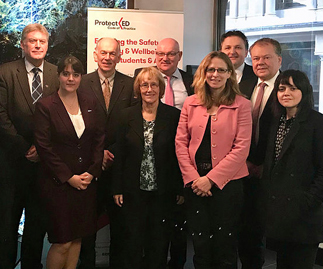Baroness Ruth Henig is the new patron of ProtectED, the code of practice and UK accreditation scheme for the safety, security and well-being of university students.
An academic historian who was for most of her career at the University of Lancaster, now a Labour working peer, Baroness Henig of Lancaster is a Deputy Speaker in the House of Lords. During her 24 years as a Labour member of Lancashire County Council, she chaired the Lancashire Community Safety Partnership and served as Chair of the Lancashire Police Authority, later being appointed President of the Association of Police Authorities. She served as Chair of the Security Industry Authority (SIA) — the UK private security industry regulator – from 2007 to 2013. In 2016 she was appointed President of the Security Institute; and is non-executive chair with the guarding firm SecuriGroup.
Andrew Wootton, ProtectED Director said: “It’s a real pleasure be able to welcome Baroness Henig as our new ProtectED Patron. Her insight and considerable experience improving standards of practice in the UK will make a significant contribution to the success of ProtectED.”
Baroness Henig said: “ProtectED brings together a number of issues that I have long been passionate about — ensuring a safe experience for university students; high quality security services; and taking a partnership approach to safety in the higher education sector. The ProtectED Code of Practice offers, for the first time, a student safety, security and wellbeing standard for universities to aspire to, and a practical, robust method of assessing and raising standards across the sector.”
ProtectED background
ProtectED launched in February 2017, after three years of research and development by University of Salford academics, services staff, and security consultants K7 Compliance. The scheme is founded on the understanding that universities play a critical role in student safety, security and well-being — that does not end at campus boundaries but takes in the wider ‘student experience’. Current practice in this critical area varies around the UK, while at the same time the sector lacks a cohesive evidence base from which to better understand ‘what works’; ProtectED seeks to remedy this, say organisers.
Pictured left to right are Trevor Jones, head of security and community support at the University of Salford; Dr Luba Pirgova-Morgan of ProtectED; Prof Allan Walker, Dean of the School of Arts and Media t Salford; Baroness Henig, Brian Nuttall of K7; Dr Caroline Davey, Director of the Design Against Crime Solution Centre at Salford; Andrew Wootton; Dave Humphries, Director of Partnerships and Interventions at the SIA; and Dr Lucy Winrow, ProtectED Communications Manager.
The ProtectED Code of Practice adopts a modular structure, addressing student safety security and well-being across: Core Institutional Safety & Security; Student Well-being and Mental Health; International Students; Student Harassment and Sexual Assault; and the ‘Student Night Out’. All measures are based on recommendations and guidance, and supported by case studies of good practice from across the sector. Universities seeking the accreditation benchmark themselves against the requirements outlined in the code of practice, before they apply. Assessment is overseen by a Peer Review Panel, with follow-up verification visit by ProtectED assessors, and student assessors. Successful universities are awarded ProtectED Accredited Institution status.
The ProtectED Advisory Board includes representatives from: the UK campus security manager group the Association of University Chief Security Officers (AUCSO); the Security Industry Authority (SIA); the National Union of Students (NUS); British Council; the Association of Managers of Student Services in Higher Education (AMOSSHE); Universities UK; Police Association of Higher Education Liaison Officers (PAHELO); Endsleigh Insurance; the National Landlords Association (NLA); the College and University Business Officers (CUBO); the International Professional Security Association (IPSA); and the British Security Industry Association (BSIA).
About 50 universities have expressed an interest in ProtectED membership and becoming ‘early adopters’ of accreditation. Visit www.protect-ed.org.









